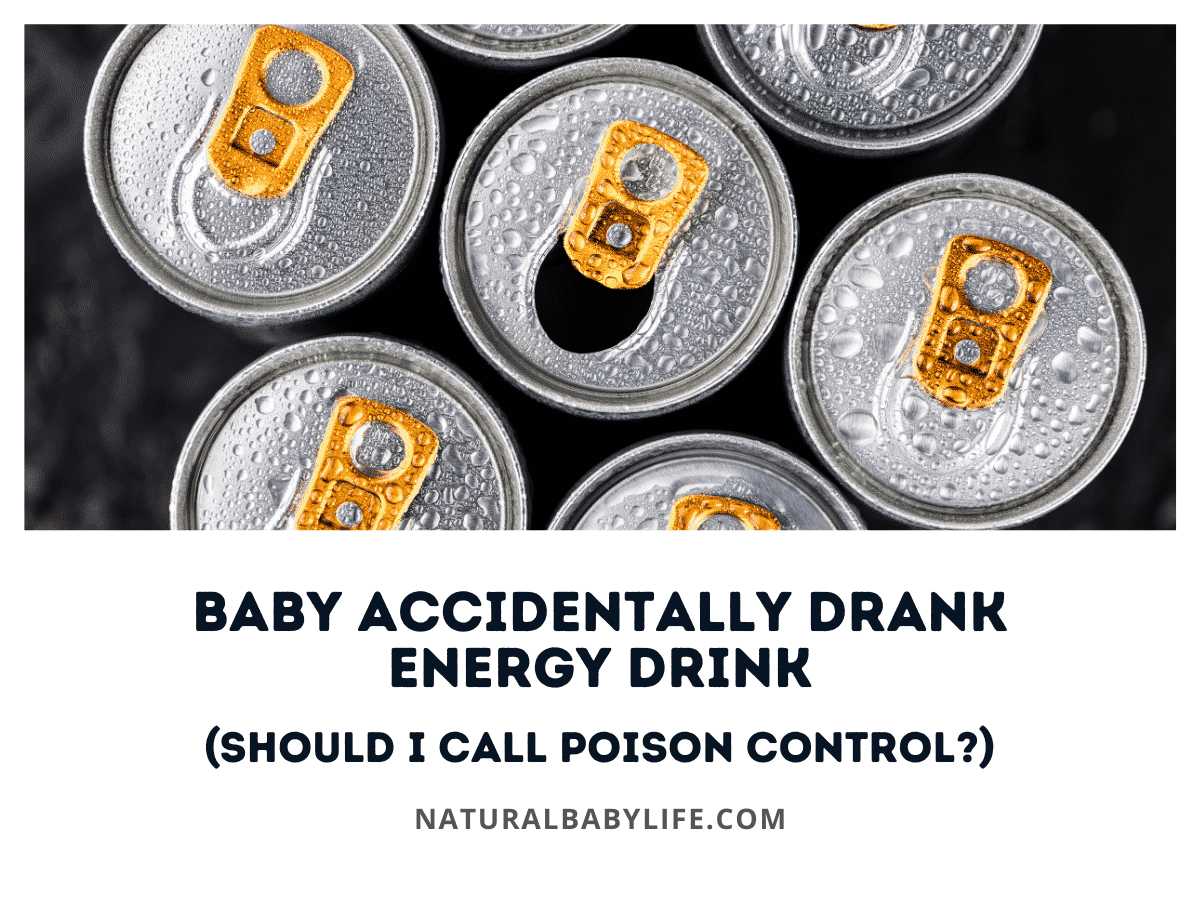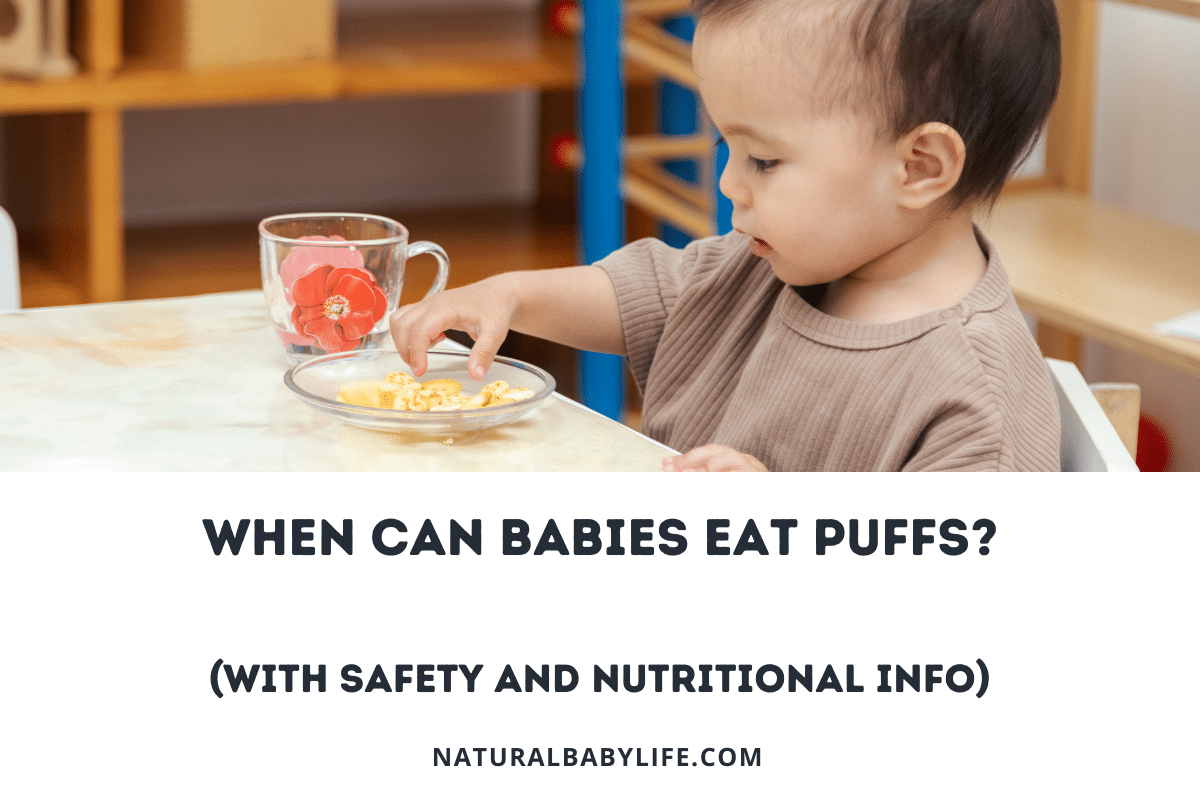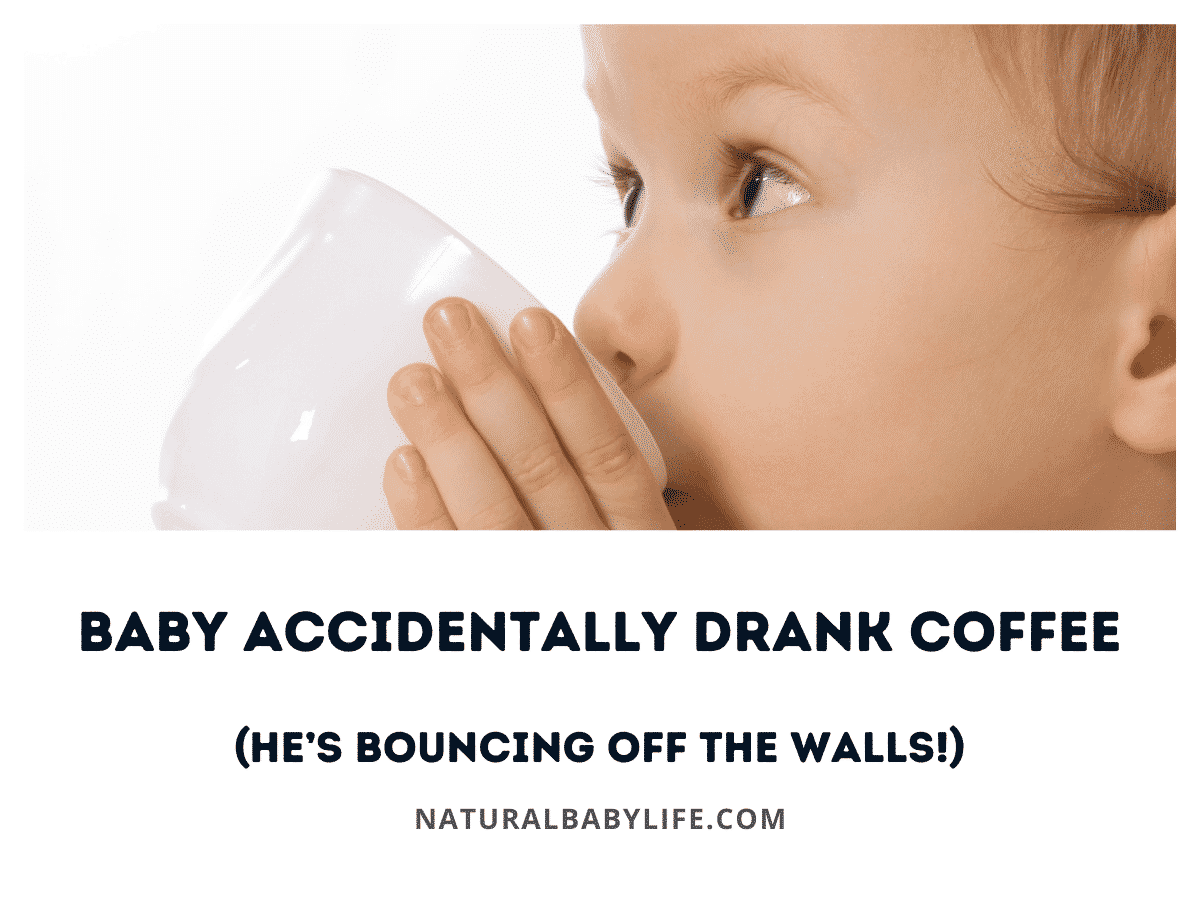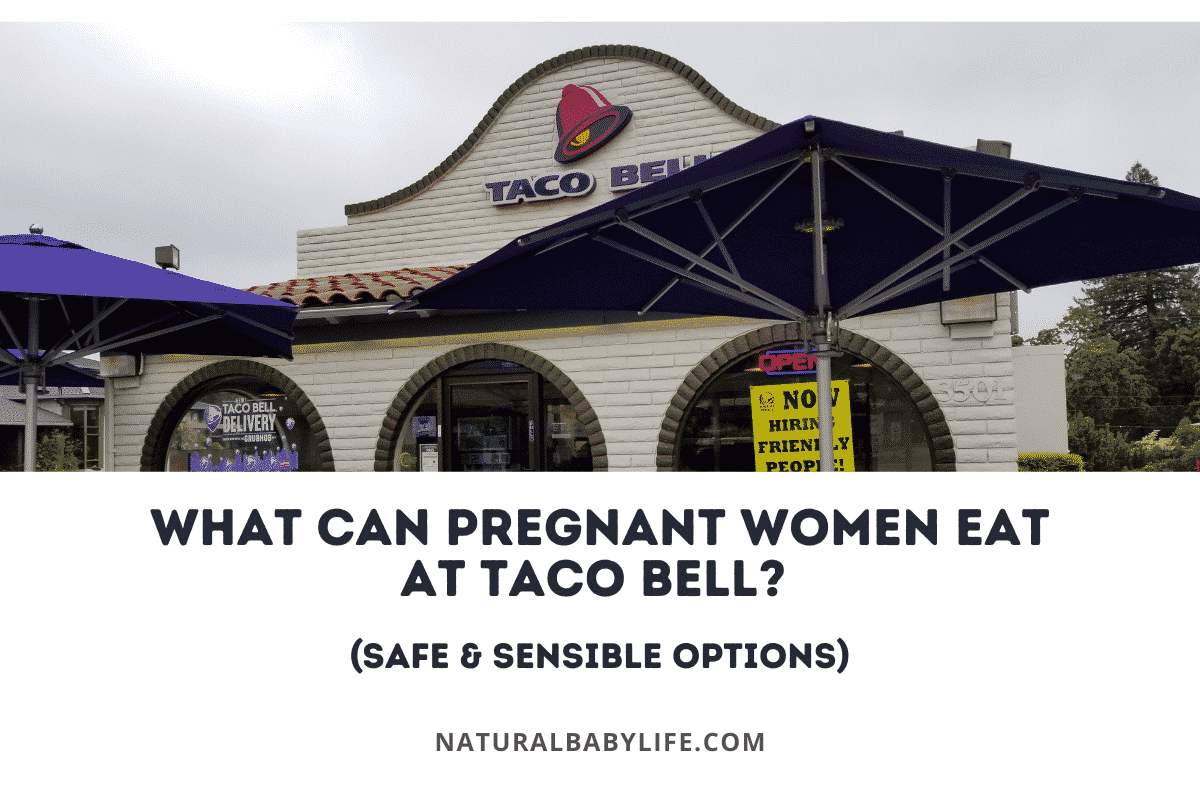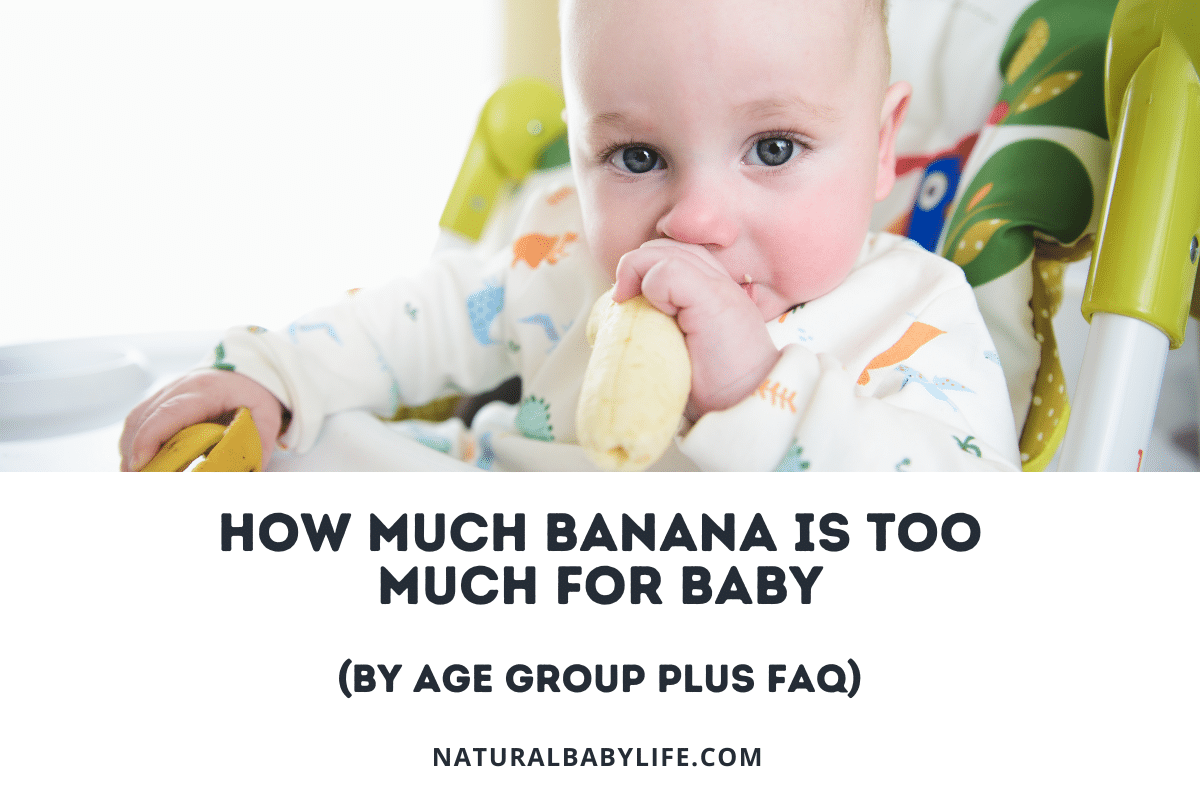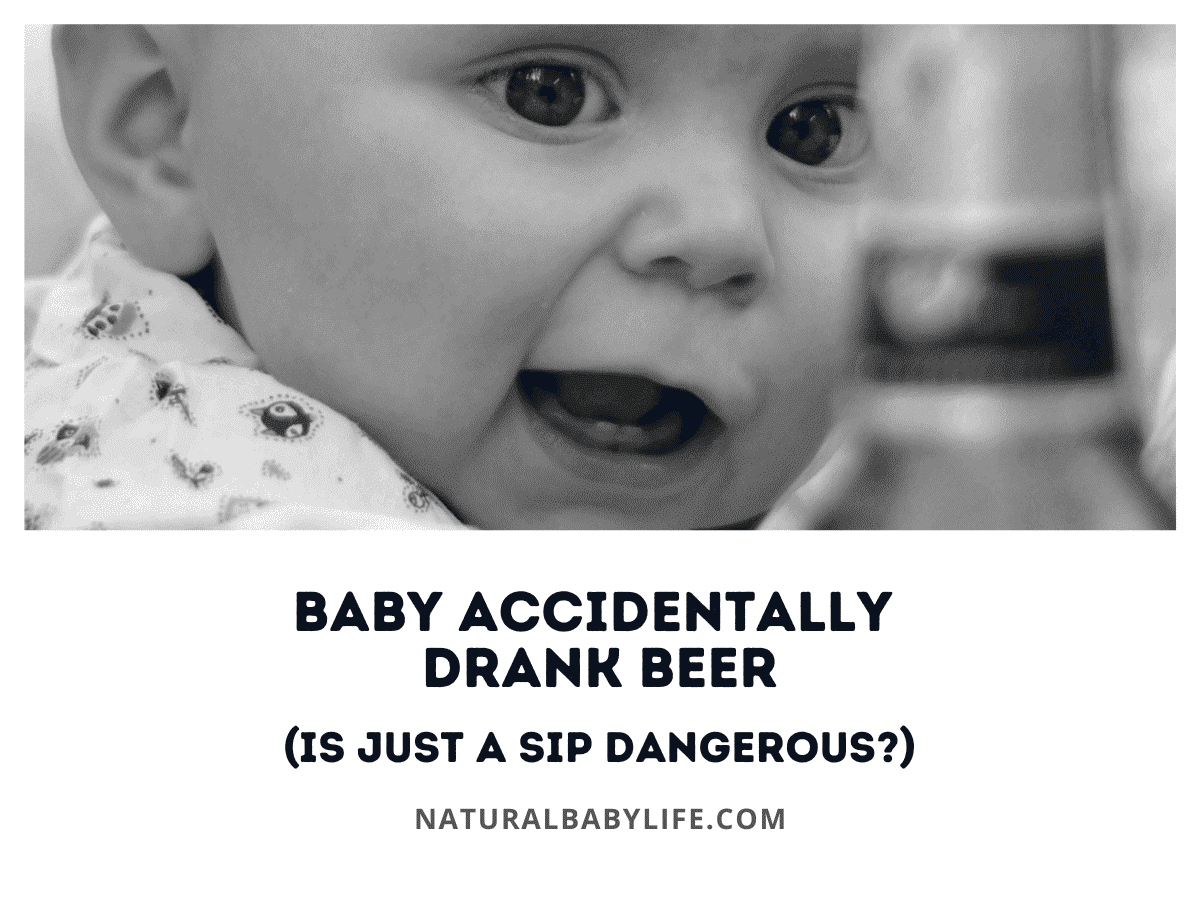Babies and toddlers are notorious for eating and drinking stuff they aren’t supposed to; ingesting everything from dog food, to dirt, to that can of soda you’d forgotten you left out. But some substances, including energy drinks, can be much more dangerous for your baby to consume than others.
Energy drinks are never safe for babies because of the high amount of caffeine and tempting taste. Small amounts can cause jitters or anxiety, while large amounts (such as a full can) may give a child caffeine poisoning. If your baby is vomiting or is having difficulty breathing, you should call poison control or seek immediate medical treatment.
But why aren’t energy drinks safe for babies, and when is it safe for older children to start drinking them? Keep reading to learn more!
Table of Contents
Is it bad if a baby accidentally drinks an energy drink?
It can be downright dangerous for a baby to consume an energy drink.
The biggest danger of energy drinks lies in their caffeine content; while adults can usually process the level of caffeine found in energy drinks, babies and children are too small to be able to handle such high levels of caffeine. Because caffeine can be dangerous to children, the American Academy of Pediatrics (AAP) recommends that children under the age of 12 shouldn’t consume any caffeine, even in small amounts.
If your baby happens to find a mostly empty energy drink and only drinks a few drops, they will probably be just fine. You may notice, though, that even a small amount of energy drink may make your baby act jittery, anxious, or even colicky. While your child’s behavior can lead to a difficult few hours while the caffeine passes out of their system, there should be no long-term health effects.
If your child accidentally drinks a substantial amount of an energy drink, though, they may be at risk for a caffeine overdose. Symptoms of caffeine poisoning can include vomiting, severe shaking, difficulty breathing, and even seizures. If you think your child may have caffeine poisoning, you should call poison control or seek immediate medical treatment.
What to do if baby accidentally drinks an energy drink
Finding out your baby has gotten into something they shouldn’t can make a parent panic and fear the worst immediately. While some things we worry about aren’t likely to be as big of a problem as our nerves might make us believe, you should pay close attention if you find out your little one has been sipping from a can of energy drink.
If your baby accidentally drinks an energy drink, you should:
- Estimate consumption. Try to determine how much of the drink your baby has had. A few drops of energy drink is rarely problematic, but a whole can might lead to caffeine poisoning.
- Observe symptoms. Check your baby for symptoms of a reaction to the caffeine. If they’ve only had a little bit of the energy drink, you may notice a bit of jitteriness. Large amounts of energy drink consumption can manifest as vomiting, severe shaking, or difficulty breathing.
If your baby seems mostly unaffected by the energy drink and only exhibits mild symptoms (jitters or extra energy), you should wait it out. Caffeine jitters usually last 3-5 hours, but it can take nearly 10 hours for caffeine to clear completely from the body. Make sure your baby stays well hydrated, and give him plenty of space to move around and work some of the extra energy off.
If your baby is exhibiting severe symptoms (vomiting, severe shaking, difficulty breathing), you should seek medical help. If your baby is showing symptoms of caffeine poisoning, you should call poison control immediately (1-800-222-1222). They may ask you what brand of energy drink your child had, how much of it was consumed, what symptoms your little one is exhibiting, and the age of your child. The more information you can provide, the better. If your child can’t breathe or is having a seizure, call 911 immediately. Large amounts of caffeine can be fatal.
If you’re ever worried about something your child has consumed, don’t hesitate to call poison control. They can help you determine if your little one is in any danger, and advise you on the next steps.
When can children have energy drinks?
Not only do energy drinks contain high levels of caffeine, they also may contain high levels of sugars and additional additives that may pose unknown dangers to children.
Because of this, the American Academy of Pediatrics (AAP) recommends that children under the age of 12 shouldn’t drink energy drinks, or anything with caffeine, for that matter.
Once your child turns 13, though, energy drinks might still be off the table. Experts recommend that children ages 13-18 limit their caffeine intake to 100 mg of caffeine each day. Most energy drinks contain approximately 100 mg of caffeine per can, which means that teenagers probably shouldn’t be drinking more than a single energy drink per day.
And if your teenager likes to drink a cup of coffee each morning, then they’ll have hit their caffeine limit by breakfast (a single cup of black coffee usually contains 95 mg of caffeine).
Is too much caffeine bad for babies
The AAP recommends that children under the age of 12 shouldn’t consume any caffeine. Children older than 4 can, however, consume very small amounts of caffeine as an occasional treat (say, a small caffeinated soda or a bar of chocolate).
Consuming more than 50 mg of caffeine per day can cause dangerous side effects in children, and can pose unknown dangers to their long term health and brain development. Caffeine is in no way part of a healthy childhood diet, and should be kept to a minimum consumption wherever possible.
If you do choose to give your child caffeine, you should make sure it is no more than 45 mg per day (for reference, there are 34 mg of caffeine in a single can of Coke).
How much caffeine is dangerous for baby
Caffeine poisoning levels vary based on the individual, but, in general, consuming more than 2.5 mg of caffeine per 2.2 pounds of body weight per day can be dangerous.
Babies average around 7.6 pounds at birth and grow to an average of 22 pounds by their first birthday. That means that newborns can experience caffeine poisoning after consuming only 8.6 mg of caffeine (1/10th a can of energy drink) and 1-year-olds can experience caffeine poisoning after consuming 25 mg of caffeine in a day (1/4th a can of energy drink).
How much caffeine is dangerous for a toddler
The formula for safe amounts of caffeine consumption is the same for toddlers as it is for babies: 2.5 mg of caffeine per 2.2 pounds of body weight per day is the upper limit for safe consumption.
Toddlers usually range in size from a 22-pound average at 1 year up to 30 pounds or more by age 3. That means that a toddler may begin to experience caffeine poisoning after consuming 25-35 mg of caffeine (or just one can of Coke).
Signs of a caffeine overdose
Your baby will show the same signs that you do when affected by caffeine, although it may seem like more as they are more active to start with and don’t know how to control their impulses yet. When they get ahold of a caffeinated drink, most kids will just need to be given lots of space to run it out while you prepare for the inevitable crash. However, if baby consumes too much caffeine for their body to safely process, they could experience a caffeine overdose.
If your baby does experience a caffeine overdose, he or she may:
- Seem jittery or irritable
- Act anxious
- Vomit or seem nauseous
- Have an extremely fast heartbeat
- Experience uncontrollable muscle movements
- Go into shock
- Have difficulty breathing.
If your baby is exhibiting severe signs of a caffeine overdose or has consumed an excessive amount of caffeine, call poison control at 1-800-222-1222 or seek medical help immediately.
Are energy drinks bad for baby?
Energy drinks can be very bad for babies. Not only do energy drinks contain exorbitant levels of caffeine, but a single 16-oz can of energy drink can also contain anywhere from 54 to 62 grams of added sugar!
Sweetened drinks are known to cause tooth decay and health problems in children, as well as increase their risk for obesity. Sweet drinks can also impact the health of a child’s overall dies by replacing healthy food alternatives such as water and milk with the empty calories of added sugars.
The caffeine levels in energy drinks can cause serious heart problems and damage the still-developing nervous system in children. High levels of caffeine have also been associated with disrupted sleep patterns, dehydration, anxiety, and digestive problems.
Amount of caffeine in popular energy drinks
| Energy Drink | Amount of Caffeine per Container | Call Poison Control if Your Baby Consumes More Than | Call Poison Control if Your Toddler Consumes More Than |
|---|---|---|---|
| Red Bull | 80 mg 8 oz can | 20% | 50% |
| Monster | 160 mg 16 oz can | 9% | 20% |
| Rockstar | 160 mg 16 oz can | 9% | 20% |
| V8 Energy Drink | 80 mg 8 oz can | 20% | 50% |
| Mountain Dew Kickstart | 92 mg 16 oz can | 16% | 33% |
| AMP | 142 mg 16 oz can | 10% | 25% |
| Crystal Light Energy Drink (mixed with water) | 60 mg 16 oz mixture | 25% | 66% |
Is Red Bull energy drink bad for babies
Red Bull is one of the most popular brands of energy drink, and is mostly carbonated water with a mix of sugar, caffeine, taurine and B vitamins added in.
Red Bull is not recommended for babies, as it contains large amounts of caffeine and 27 grams of added sugars per can.
How much caffeine is there in Red Bull
Red Bull contains 80 mg caffeine per 8 oz can.
Baby drank Red Bull
Babies can usually only consume 15 mg of caffeine per day before they experience caffeine poisoning.
If your baby has had more than ⅕ a can of Red Bull, you should call poison control immediately. If your baby has had less than ⅕ a can, you can wait to see if your baby develops symptoms.
Toddler drank Red Bull
Toddlers can usually only consume 35 mg of caffeine per day before they experience caffeine poisoning.
That means that if your toddler has had more than ½ a can of Red Bull, you should call poison control immediately. If your toddler has had less than ½ a can, you can wait to see if your toddler develops symptoms.
Is Monster energy drink bad for babies
Monster is a popular brand of energy drink, and is mostly carbonated water with plenty of sugar, caffeine, and additional ingredients.
Monster is not recommended for babies, as it contains large amounts of caffeine and lots of added sugar.
How much caffeine is there in Monster
Monster contains 160 mg of caffeine per 16 oz can.
Baby drank monster energy drink
Babies can usually only consume 15 mg of caffeine per day before they experience caffeine poisoning.
If your baby has had more than 9% of a Monster, you should call poison control immediately. If your baby has had less than 9%, you can wait to see if your baby develops symptoms.
Toddler drank monster energy drink
Toddlers can usually only consume 35 mg of caffeine per day before they experience caffeine poisoning.
That means that if your toddler has had more than 20% of a Monster, you should call poison control immediately. If your toddler has had less than 20%, you can wait to see if your toddler develops symptoms.
Is Rockstar energy drink bad for babies
Rockstar energy drinks contain caffeine and sugar, as well as a large variety of herbs that increase the caffeine level of the drink naturally.
Rockstar energy drinks are not recommended for babies, as they contain large amounts of caffeine and added sugar.
How much caffeine is there in Rockstar
Rockstar contains 160 mg of caffeine per 16 oz can.
Baby drank Rockstar energy drink
Babies can usually only consume 15 mg of caffeine per day before they experience caffeine poisoning.
If your baby has had more than 9% of a Rockstar, you should call poison control immediately. If your baby has had less than 9%, you can wait to see if your baby develops symptoms.
Toddler drank Rockstar energy drink
Toddlers can usually only consume 35 mg of caffeine per day before they experience caffeine poisoning.
That means that if your toddler has had more than 20% of a Rockstar, you should call poison control immediately. If your toddler has had less than 20%, you can wait to see if your toddler develops symptoms.
Is V8 energy drink bad for babies
V8 is actually famous for their juice drinks, but they do have an energy drink that adds natural sources of caffeine into their vegetable juice mix.
While V8 energy doesn’t have much added sugar (only 10 grams/8 oz), it still isn’t recommended for babies because of its caffeine levels.
How much caffeine is there in the V8 energy drink
V8 energy drinks contain 80 mg of caffeine per 8 oz can.
Baby drank V8 energy drink
Babies can usually only consume 15 mg of caffeine per day before they experience caffeine poisoning.
If your baby has had more than ⅕ a can of V8 energy, you should call poison control immediately. If your baby has had less than ⅕ a can, you can wait to see if your baby develops symptoms.
Toddler drank V8 energy drink
Toddlers can usually only consume 35 mg of caffeine per day before they experience caffeine poisoning. That means that if your toddler has had more than ½ a can of V8 energy, you should call poison control immediately.
If your toddler has had less than ½ a can, you can wait to see if your toddler develops symptoms.
Is Mountain Dew Kickstart bad for babies
Mountain Dew Kickstart takes a popular soda and adds in extra caffeine.
Mountain Dew Kickstart is not recommended for babies, as it contains large amounts of caffeine and added sugar.
How much caffeine is there in Mountain Dew Kickstart
Mountain Dew Kickstart contains 92 mg of caffeine per 16 oz can.
Baby drank Mountain Dew Kickstart
Babies can usually only consume 15 mg of caffeine per day before they experience caffeine poisoning.
If your baby has had more than ⅙ a can of Mountain Dew Kickstart, you should call poison control immediately. If your baby has had less than ⅙ a can, you can wait to see if your baby develops symptoms.
Toddler drank Mountain Dew Kickstart
Toddlers can usually only consume 35 mg of caffeine per day before they experience caffeine poisoning.
That means that if your toddler has had more than ⅓ a can of Mountain Dew Kickstart, you should call poison control immediately. If your toddler has had less than ⅓ a can, you can wait to see if your toddler develops symptoms.
Is AMP energy drink bad for babies
AMP energy drinks are another Mountain Dew foray into energy drinks.
They are not recommended for babies due to their added sugars and caffeine levels.
How much caffeine is there in AMP
AMP contains 142 mg of caffeine per 16 oz can.
Baby drank AMP energy drink
Babies can usually only consume 15 mg of caffeine per day before they experience caffeine poisoning.
If your baby has had more than 10% of a can of AMP, you should call poison control immediately. If your baby has had less than 10%, you can wait to see if your baby develops symptoms.
Toddler drank AMP energy drink
Toddlers can usually only consume 35 mg of caffeine per day before they experience caffeine poisoning.
That means that if your toddler has had more than 25% of a can of AMP, you should call poison control immediately. If your toddler has had less than 25%, you can wait to see if your toddler develops symptoms.
Is Crystal Light energy drink mix bad for babies
Crystal Light is best known for their powdered drink options, which now include a caffeinated ‘Energy’ version.
While it doesn’t contain any sugar, Crystal Light energy is still not recommended for babies due to its caffeine content.
How much caffeine is there in Crystal Light energy drink mix
Crystal Light Energy contains 60 mg of caffeine per 16 fluid oz. serving.
Baby drank Crystal Light energy drink mix
Babies can usually only consume 15 mg of caffeine per day before they experience caffeine poisoning.
If your baby has had more than ¼ a serving of Crystal Light Energy or if she consumes the mix before it has been combined with water, you should call poison control immediately. If your baby has had less than ¼ a serving, you can wait to see if your baby develops symptoms.
Toddler drank Crystal Light energy drink mix
Toddlers can usually only consume 35 mg of caffeine per day before they experience caffeine poisoning.
That means that if your toddler has had more than ⅔ a serving of Crystal Light Energy or if she consumes the mix before it has been combined with water, you should call poison control immediately. If your toddler has had less than ⅔ a serving, you can wait to see if your toddler develops symptoms.

